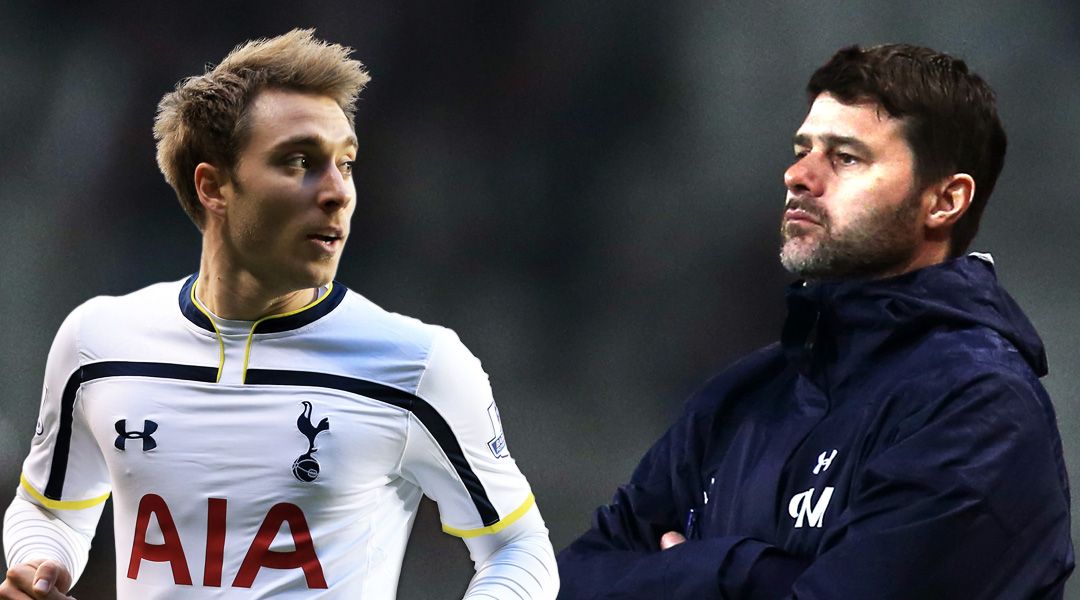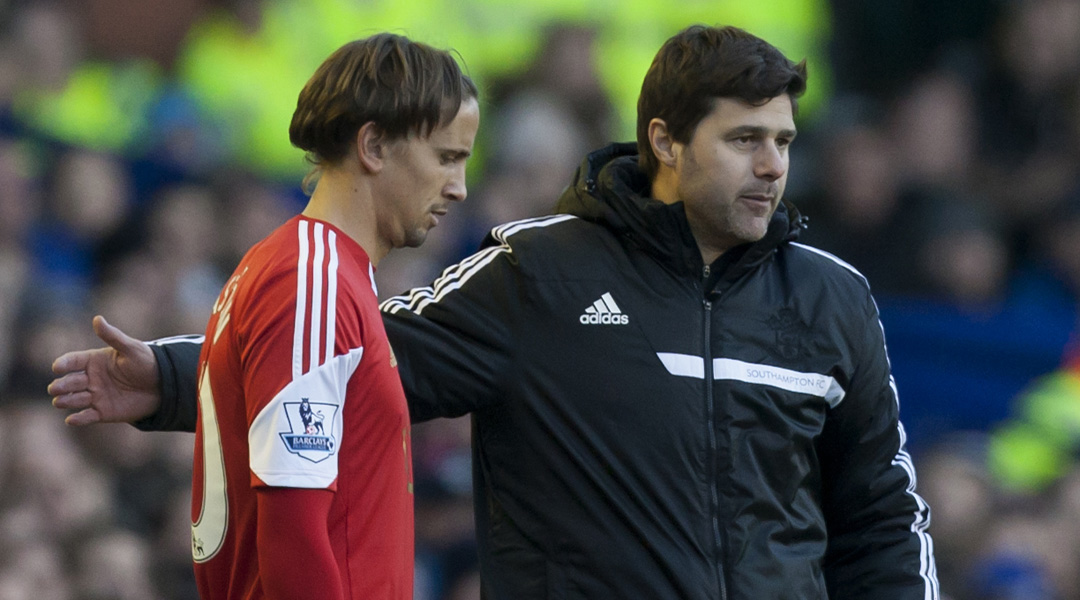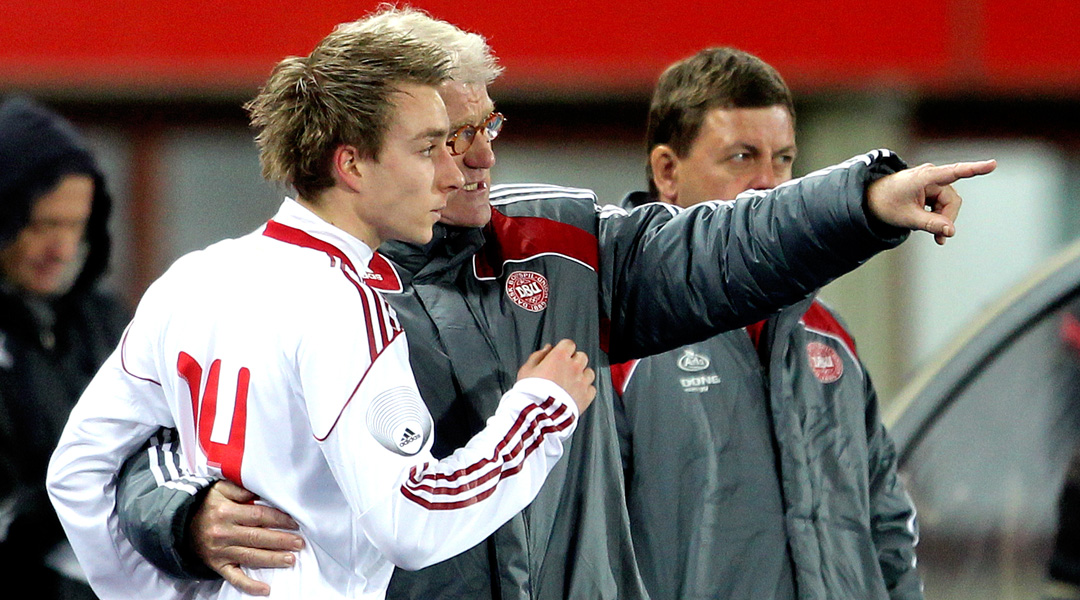How Pochettino and Eriksen taught each other a valuable lesson
Raj Bains charts the development of Tottenham's Danish midfield schemer under new boss Mauricio Pochettino...

There was a worryingly familiar issue for Tottenham last weekend, one which was a large contributing factor in their loss to Crystal Palace – and no, it wasn't Alan Pardew.
On the occasions Christian Eriksen has failed to perform for Tottenham this season, the team on the whole has suffered.
As seen again on Saturday, space in the final third is less easy to come by as a result, and the knock-on effect limits the impact Harry Kane, Nacer Chadli and Andros Townsend can have on the game.
However, in recent weeks, this type of performance has been in a distinct minority, and there’s no reason to think that as the season wears on, it won’t become even rarer still.
It wasn't long after Mauricio Pochettino was unveiled as the new Spurs manager that concerns were raised about how effectively last season's star man could be integrated in to the Argentine's intense style of football.
They seemed like an odd couple; a mis-match; an elegant square peg trying to penetrate a round hole. It was a fear fuelled by Gastón Ramírez's plight at Southampton, and the Uruguayan's alienation having failed to adhere to Pochettino's specific instructions.
Teething trouble
Get FourFourTwo Newsletter
The best features, fun and footballing quizzes, straight to your inbox every week.
Like many Tottenham players, Eriksen began this season indifferently. It was clear that his role had changed from the season before, and his discomfort in adapting was clear for all to see. While his energy levels appeared to have increased, his productivity and effectiveness were called in to question.
Previously, under Andre Villas-Boas, he was played centrally in a band of three behind the striker, and his ability gradually became more apparent as the season wore on.
In the four-man midfield favoured by Tim Sherwood, the Dane was farmed out wide, but his best moments again came when he abandoned all positional discipline and tucked inside. For all his ability, there appeared to be a distinct lack of versatility.
It seemed all too easy to compare the freedom Eriksen and Ramírez appeared to require, and the tactical friction that could cause with Pochettino, who demanded his players contribute evenly between defence and attack.
With the level of autocracy he had at Southampton, not to mention the respect he’d earned from his young squad, Pochettino went largely unchallenged when the Hampshire club's £12 million record signing began to slip further and further away from first-team contention. With Spurs chairman Daniel Levy and a slightly more experienced squad, that level of control was never likely to be replicated. Pochettino had to find an answer.

Through his own accelerated period of self-discovery, adaptation and growth, the newfound versatility allowed by Pochettino's tactical ideology was transferred to his club's star player, and the performances of Eriksen took a dramatic turn for the better.
Finding comfort in a more settled side – something he’d lacked in the early months of his reign – Pochettino allowed himself the relative luxury of incorporating Eriksen in a slightly freer role than he’d have previously opted for. Yet there was still an understanding that defensive work would be required.
That level of flexibility was something that had so far eluded Pochettino in management. It’s not a surprise, either, when you take into account the level of inspiration he took from Marcelo Bielsa when making the transition from player to coach.
Bielsa is a manager who takes single-minded and blind tactical rigidity to previously unexplored levels. He’s a maverick, a genius, and one of the most potentially volatile characters in the game.
To Bielsa, footballers are merely pawns in a masterplan, and it should be them who pander to his needs, rather than the other way around.
Boom or bust
That shared focus, while obviously far from being as dramatic, was something that brought Pochettino a huge level of success in his pre-Tottenham roles. If you were to ask Southampton fans for their biggest reservation about their former manager, most would cite his “lack of a Plan B”.
That’s a clear indication of the boom-or-bust tactics employed by Bielsa in his management. Yet Pochettino still found relative success with that ideology, with Southampton’s core of young players willing to adhere to their manager's every last wish.
The transformations of Adam Lallana, Jay Rodriguez, Luke Shaw, Calum Chambers, Morgan Schneiderlin and Rickie Lambert under Pochettino led to all but two of them being sold for vastly inflated fees in the last transfer window. They were all performing within roles that their manager had created for them, rather than it being a collaborative effort to adapt.
The fact that movement away from that outlook under new circumstances at a different club has started to bring Pochettino success shouldn’t be seen as somebody going against their principles, but evolving and growing as a manager. After all, there’s a reason Bielsa rarely stays in a job for more than a couple of years.
Eriksen, in response to the flexibility that his manager has shown towards him, and the clear mutual understanding developing between the two, has responded by expanding his own game further than he’s looked to have done previously.
It’s a telling time in the development of the player too, as he’s come in for harsh criticism from his national team manager for failing to impose himself in the manner a player of his class should be doing. Morten Olsen, the Denmark coach, even went as far as to say that Eriksen has shown little to prove he’s a better player now than he was as an Ajax trainee. As the old saying suggests, the truth tends to hurt.

Since then, the 22-year-old has pushed himself, perhaps the hardest he ever has since becoming a professional. His starting position on the ball has dropped deeper, his touches have come in less predictable places than they used to, and his hunger to affect a game has never been greater.
There are plenty of players of a comparable skill level who fail to make the most of their careers and talent due to a failure of application. The likes of Hatem Ben Arfa, Adel Taarabt and Ravel Morrison are but a small selection of those who only have themselves to blame for not yet becoming the players they could be if they committed themselves to their profession. It seems cliché to state, but it’s no secret that the Ronaldos and Messis of the world become the players they are through supreme dedication.
At the turn of the year, only three Premier League players had covered more ground this season than Eriksen, who clocked up 210km ran. Last season, he passed forwards 24.36 times per game, passed successfully 35.48 times, had a total pass completion of 82% and had an average pass length of 18.48m.
However, this season his forward passing has increased to 28.19 per match, his successful passes have jumped up to 40.48, his total pass completion is now 84% and his passes have become shorter at an average of 16.62m. In short, this season has seen him pass the ball more, much more accurately and across significantly shorter distances.
Hard work paying off
Perhaps most pleasing for Pochettino, Eriksen’s tackles won per game have shot up from just 0.76 last season to 1.14 this, and his overall take-on percentage has risen dramatically from 46.30% to 65.85%.
Having often been accused of making himself scarce when it came to the rough-and-tumble of top-level football, there certainly appears to be a concerted effort from both the Dane and his manager to prevent such criticism lingering.
The hard work that Eriksen has shown to fulfil the style of football Pochettino aims to create at Tottenham isn’t an isolated incident. If you were to look across the squad, you’d find similar stories cropping up in almost every other department.
Of the players now deemed Pochettino's strongest XI, the average age is just 23.6 years old. Hugo Lloris, now the regular captain, is the oldest at 28, and having just turned 20, Nabil Bentaleb is the youngest.
If the team can grow in tandem and avoid the widespread managerial and personnel changes that have plagued previous cycles, there’s no reason that this Tottenham side can’t become something wonderfully effective with Pochettino in charge, and Eriksen as the spearhead.
